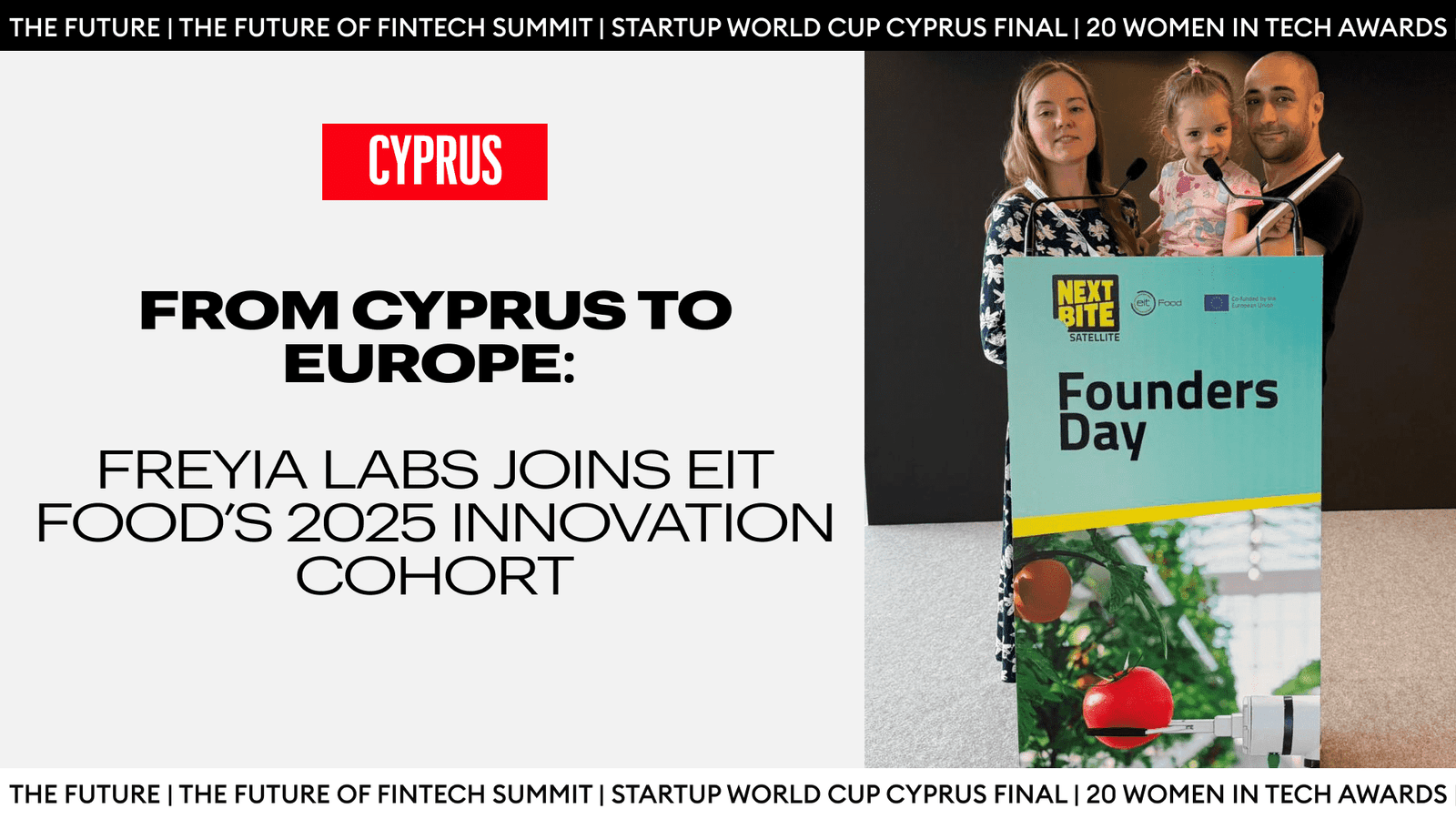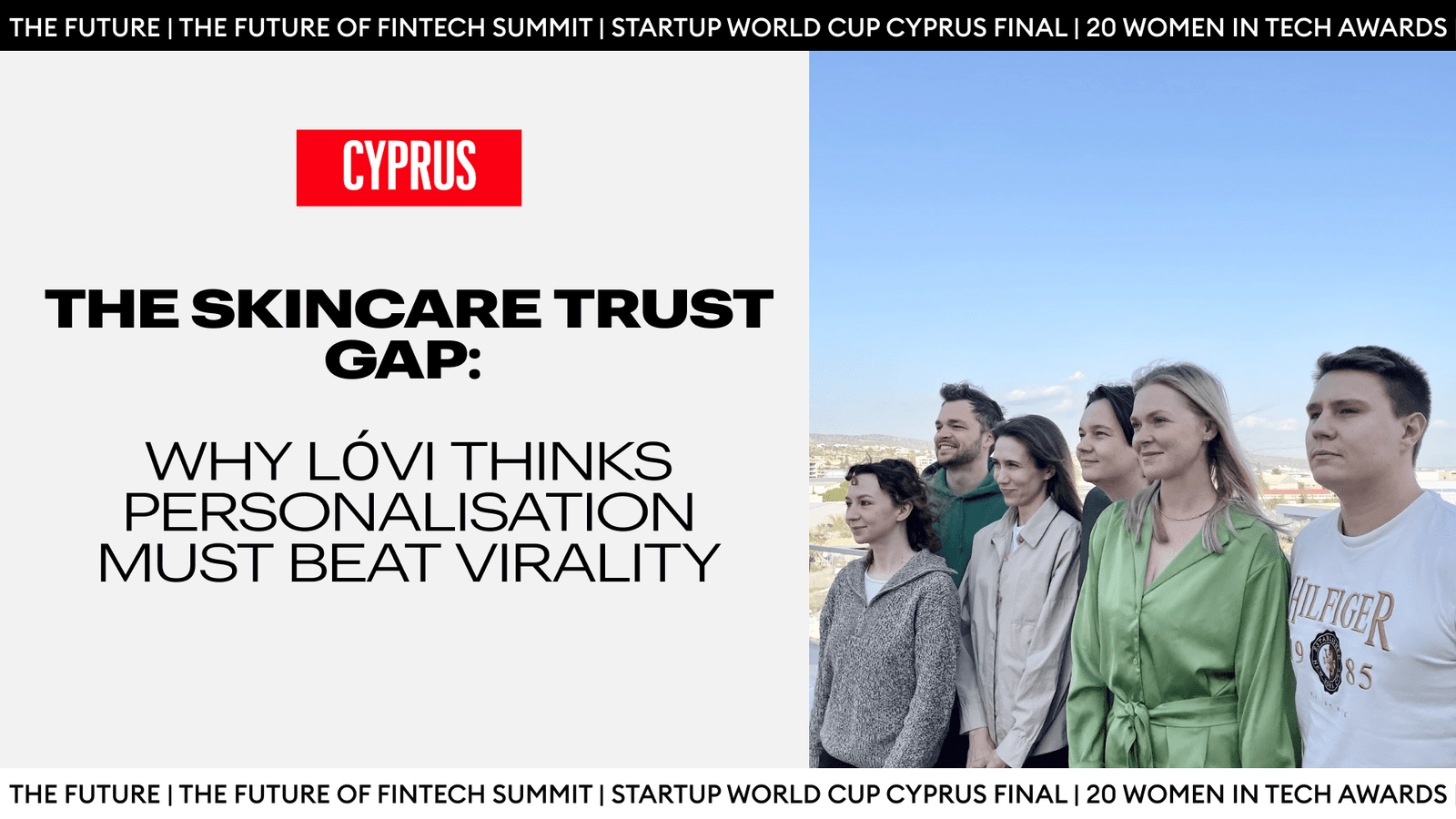Freyia Labs, a Cyprus-based food tech startup co-founded by Greta Skemaite (CEO) and Vasilis Joseph (COO), has been selected for the 2025 cohort of the EIT Food Seedbed Incubator—Europe’s leading early-stage programme for science-driven food innovation.
Co-funded by the European Union, the programme supports researchers and entrepreneurs working on technologies that improve how food is produced, distributed, and accessed. Each year, the programme selects a cohort of early-stage teams tackling major system-level challenges, from affordable nutrition and sustainable agriculture to agri-tech adoption and novel food acceptance. The 2025 programme includes just 50 teams from across Europe, and provides funding, expert mentorship, and a platform for early innovators to test their ideas with real-world stakeholders. Since its launch, it has supported over 200 teams, built 35+ startups, and helped teams raise over €33 million in follow-on funding.
Follow THE FUTURE on LinkedIn, Facebook, Instagram, X and Telegram
Founded by Greta Skemaite (CEO) and Vasilis Joseph (CTO), Freyia Labs is developing modular biomanufacturing tools that combine microbial intelligence with machine learning. Their mission is to equip and empower small and medium producers with precision fermentation systems designed to work in real-world, low-infrastructure environments.
As the sole representative of Cyprus on this year’s list, Freyia’s selection not only validates Freyia’s approach but also positions the island as an emerging player in Europe’s foodtech landscape.
In this interview with The Future Media, the co-founders discuss what this milestone means for their work, Cyprus’s influence on their innovation mindset and product philosophy, and how they’re combining tradition and technology to build a more sustainable future.
For readers unfamiliar with Freyia Labs, how would you describe what you do, not just as a foodtech company, but in terms of the mission driving your work?
Freyia Labs is a deeptech foodtech startup based in Cyprus. We’re developing F.O.R.S.E.T.I.X., a machine-learning-powered platform that helps food and beverage producers optimise their fermentation processes. But beyond the software, our mission is to be part of rebuilding food systems that are intelligent, inclusive, and waste-free.
We believe that precision-controlled fermentation can unlock scalable sustainability, especially for small and medium producers, and contribute to a Net Zero food system built on resilience rather than over-engineering.
In addition to F.O.R.S.E.T.I.X., we also run Fire Alchemy, a line of functional fermented foods. The same technology is used in Fertilix, a project that transforms agricultural and household waste into valuable soil products through fermentation.
What made you apply to the EIT Food Seedbed programme specifically, and what gaps were you looking to address through it?
EIT Food Seedbed stood out because it’s designed specifically for food innovations. It not only supports early-stage technology development but also actively challenges founders to test real-world product–market fit.

We applied to validate the commercial potential of our platform across different regions and user types. The programme is helping us address key gaps in positioning, pricing, and communication, particularly important for a deeptech startup like ours.
It also connects us with specialised mentors in food innovation and provides tailored training through EIT Education. This kind of domain-specific support is rare and valuable, and it’s helping us bridge the gap between technical capability and commercial scalability.
Being selected by EIT Food places Freyia among some of Europe’s most promising agri-food innovators. What does this recognition mean to you (beyond visibility), and how do you plan to use this platform?
It’s a strong validation that our approach, blending ancient microbial processes with machine learning, has real relevance for today’s food challenges. More than just visibility, it connects us to a European ecosystem that values systemic change and supports long-term impact.
We’re using this platform to initiate pilot programmes, build partnerships with producers, and contribute to a broader conversation about decentralised innovation in fermentation. It also sends a powerful signal to funders and collaborators that we’re building something credible and scalable.
Importantly, this is just the beginning of our journey with EIT Food. The organisation offers a range of programmes designed to support startups as they grow, and we’re excited to explore those next stages.
In what ways has being based in Cyprus influenced your approach to innovation in the food tech space?
Cyprus forces you to be resourceful. It’s not a place with easy access to funding or infrastructure for deeptech food R&D. But in many ways, that’s been an advantage. We’ve had to design lean, modular systems that work in non-ideal environments, and that constraint has shaped our entire product philosophy. We’re not building tools for sterile labs in perfect conditions, but for real-world settings.
At the same time, Cyprus offers us a living connection to Mediterranean food heritage, which anchors our innovation in something culturally rich and time-tested.
The local startup ecosystem is progressing, and there’s real momentum, but it’s still early. There’s a long road ahead to reach the level of support, capital, and infrastructure available in more developed ecosystems. That’s why programmes like EIT Food are so vital: they help bridge the gap and connect us to the European innovation landscape.
The F.O.R.S.E.T.I.X platform aims to empower small producers through fermentation innovation. What have been some of the most unexpected challenges or breakthroughs in translating that vision into something tangible?
One of the biggest challenges has been balancing simplicity with sophistication. Fermentation is highly complex, but small producers need intuitive tools that don’t require a technical background. Designing a system that respects that complexity while remaining accessible has been a constant challenge.
The platform is still in development, but we’ve recently secured funding from the Research and Innovation Foundation (RIF) to accelerate this development, which marks a major milestone in making our vision tangible. This funding is helping us bring our concept closer to reality, and ultimately into the hands of the producers who need it most.
You often reference ancient practices and regenerative systems. How do local traditions, ingredients, or even Cypriot history feed into the way you think about modern food innovation?
Fermentation is one of the oldest food technologies across cultures, and we see it as a shared global heritage. Whether it’s trahanas in Cyprus, kimchi in Korea, or sauerkraut in Lithuania, traditional fermentation reflects centuries of local adaptation, preservation, and nutrition. These practices weren’t just about flavour. They were about survival, sustainability, and making the most of available resources.
At Freyia Labs, we draw inspiration from this global legacy. Our aim isn’t to replace traditional methods but to enhance them through precision, making them more consistent, scalable, and accessible.
The core of our solution is the ability to monitor and control fermentation to achieve reliable results, batch after batch, regardless of environment or producer scale.
Our approach is simple: rooted in tradition, driven by innovation.














